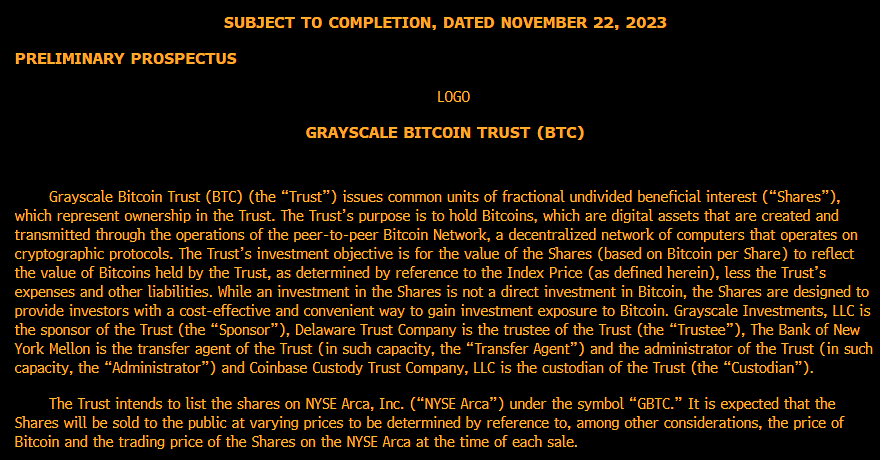The company discloses points on its proposed bitcoin ETF following a meeting with the SEC.
- BlackRock wants investors to receive bitcoin in exchange for their ETF shares.
- Due to regulatory concerns, the SEC prefers the exchange to be for cash.
The world’s largest asset management firm, BlackRock, released details of its proposed bitcoin (BTC) spot exchange-traded fund (ETF) following a meeting with the U.S. Securities and Exchange Commission (SEC). The meeting with the SEC focused on changing rules for listing and trading shares of BlackRock’s ETF under Rule 5711(d) of the Nasdaq Stock Market, an SEC document indicated (PDF). According to the text, the company argues that the fund should be redeemable in “kind,” implying that when investors redeem their shares, they will receive bitcoin instead of cash the company suggests.
Blackrock proposals
As explained by Bloomberg analyst Eric Balchunas, BlackRock advocates using in-kind redemption for bitcoin ETFs because it believes it is better for investors as it will save them money on taxes. The SEC, however, has said it prefers bitcoin ETFs to make cash redemptions. The difference means that when investors redeem their shares, they receive cash instead of bitcoin. The regulator believes this is more favorable because it will help prevent investors from using unregistered exchanges.
Looks like @BlackRock also met with SEC! There’s a couple slides in relation to in-kind vs cash creation. Based on this it looks like BlackRock prefers in-kind for their #bitcoin ETF (makes sense as its probably cleanest structure for them & end investors)
— James Seyffart (@JSeyff) November 22, 2023
h/t @btcNLNico https://t.co/AK0XspL4zJ pic.twitter.com/eeuUT9T5mn
James Seyffart, another Bloomberg analyst, said the company prefers the fund’s redemption in Bitcoin as it believes this is the “cleanest and most efficient structure for end investors.” Another sign that the process among the applicant companies is moving forward with the SEC is that Grayscale, a company that also wants to launch a Bitcoin spot ETF, amended its proposal. The changes were similar to those made by BlackRock. In this case, Grayscale has decided that the primary method of creation/redemption of its shares will be in-kind. However, the issuer has also agreed to include a limited cash process. Investors can buy or sell ETF shares by paying or receiving cash, but only in certain circumstances, said finance attorney Scott Johnsson.


Other updates include changing the ticker of the proposed ETF from $GBTC to $BTC. They also removed pages related to risk disclosures. These actions confirm that companies are constantly conversing with the SEC and making updates or changes to their documents following discussions and comments. Twelve ETF applicant companies are waiting for a response from the SEC. The regulator’s latest reaction was to delay a decision on funds from Global X and Franklin Templeton companies last week. The regulator has time until the beginning of 2024 to decide whether or not to approve the submitted applications.
Bitcoin ETF Drama
The institution of a Bitcoin exchange-traded fund (ETF) has been a hot topic among investors and cryptocurrency enthusiasts for years. However, the approval process for a Bitcoin ETF by the U.S. Securities and Exchange Commission (SEC) is rather lengthy and complex. Here are some reasons why launching a Bitcoin ETF has been challenging.
Firstly, the SEC has concerns about market manipulation. Since Bitcoin is a decentralized digital currency, no central authority regulates it, which makes it vulnerable to price manipulation by bad actors. The SEC is concerned that a Bitcoin ETF could facilitate fraud and market manipulation.
Secondly, the SEC is concerned about investor protection. The agency has hesitated to approve a Bitcoin ETF because it worries investors may need to comprehend cryptocurrency investing risks fully. The SEC wants to protect investors before approving a Bitcoin ETF.
Thirdly, the SEC is concerned about custody and security. The SEC requires that ETFs have a custodian responsible for holding and safeguarding the underlying assets. However, since Bitcoin is a digital asset, there is a non-trivial risk of theft or loss due to hacking or other cyber attacks. The SEC wants to ensure that Bitcoin ETFs are secure and that investors’ assets are protected.
Fourthly, the SEC is concerned about the lack of regulation in the cryptocurrency market. The agency has frequently noted that it will only approve a Bitcoin ETF once it is satisfied that the cryptocurrency market is regulated and that it meets the agency’s standards for investor protection.
Finally, there are concerns about tax implications. The IRS must provide clear guidance on how Bitcoin ETFs will be taxed, making it difficult for fund managers to structure their products tax-efficiently. In conclusion, the crypto-corporate world must address many challenges before the SEC approves a Bitcoin ETF. We do not doubt that Bitcoin ETFs will grow into a vast market.

